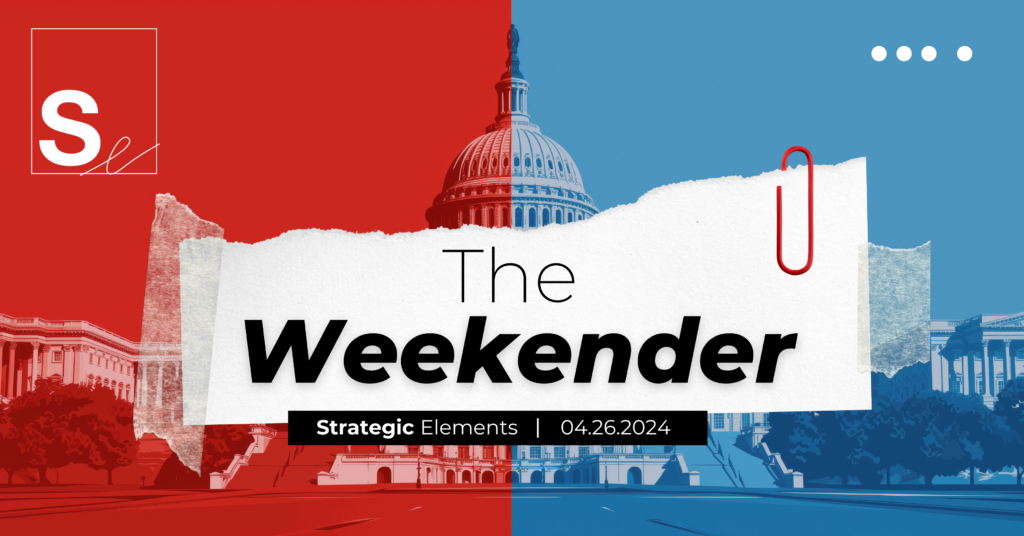DATA POINTS
- 14 Years: The time it took for Reggie Bush to have the NCAA reinstate his Heisman Trophy
- 99%: The chance that this summer will be one of the top 5 hottest summers on record
- 2028: The proposed year America’s first high-speed passenger railway will open connecting Los Angeles with Las Vegas; just in time for the 2028 Summer Olympics in LA
- $28 Million: The value of Caitlin Clark’s shoe deal with Nike
- 1 Billion: The number of streams for Taylor Swift’s new album ‘Tortured Poets Department”, making it the most streamed album in a week
- $95.3 Billion: The cost of the foreign aid package signed into law this week that also forces the sale of Tik Tok
The U.S. Budget vs. Blockchain: What’s more Complicated?
Independent Presidential candidate RFK Jr. has never shied away from making eccentric commitments on the campaign trail. His latest promise proves it: “I’m going to put the entire U.S. budget on blockchain so that any American – every American can look at every budget item in the entire budget anytime they want 24 hours a day.” So, what is a blockchain and how would line-iteming the government’s multi-trillion-dollar budget work?
Blockchains are distributed databases shared among computer nodes that do not require trusted third parties to audit them. You can think of them as a shared Excel sheet where programs (or users, depending on the type) can enter data without human error. Naturally, blockchains exploded in popularity with cryptocurrencies, which use blockchains as decentralized logs of transactions without needing a financial institution or third party to confirm their legitimacy.
While itemizing U.S. spending on a blockchain would remove individual and government agency ability to redact information, anything that can be made public is already public. The process of doing so would be a herculean task as well. If RFK Jr. insists upon publishing the entire budget, including spending from the Pentagon, intelligence agencies, and covert military operations, he may jeopardize national security and face backlash from his own administration if elected.
This campaign promise should have been unexpected given RFK Jr.’s proclivity for championing issues no one else is, but it’s nothing to ignore. He’s one of the most successful third-party candidates the U.S. has had in years (based on polling strength), and he has already qualified for the ballot in nine states. While this could be seen as a strong play for him to win over the Bitcoin crusaders and the NFT chasers, he’s tapping into Americans’ distaste for wasteful spending – and it may contribute to his voter base in his bid against President Biden and former President Donald Trump.
Workplace Politics has a Whole New Meaning

For those who choose to engage in these discussions in the workplace (and generally in their lives), here’s a helpful tip to keep in mind. These conversations are just that: conversations. They should not be treated as debates or arguments. If you are in it to win it, you shouldn’t be in it at all. Rather, listen empathetically, learn how individual experiences form opinions, and enter with an open mind and a readiness to change your stance. Importantly, understand when a conversation becomes unproductive or outright destructive.
So long as you treat your coworkers with dignity, strive to understand their position rather than combat it, and don’t stage sit-in protests, you should be in the clear to have discussions about the latest news on the job.
No Way to Beat the Heat
A heatwave may be coming soon during this year’s scorching summer. From June to August, experts predict that almost every state will be warmer than usual, with some more than others. Extreme heat will be most likely in the west and northeast and somewhat likely in the Midwest and South. The Dakotas are the only states not predicted to be hotter than usual. In the wise words of Robin Williams in Good Morning Vietnam, it’s going to be “hot, damn hot, real hot!”
After a series of hot summers, the NOAA and CDC released a HeatRisk map. This map is primarily intended to help heat-sensitive individuals, like seniors and people with underlying health conditions, to know when it is unsafe to go outside. The map uses humidity, location, and historical weather to predict how hot different areas of the US will be for the week. The record for the hottest summer in the US was in 2021, tying with the previous record in 1936. Grab the sunscreen, a cool beverage, and a stronger A/C unit because the summer of 2024 will be a formidable contender for the record.
New Competition about Noncompetes

Suzanne Clark, President and CEO of the U.S. Chamber of Commerce, released an op-ed condemning the move as the Chamber is prepared to file a lawsuit against the FTC. The Chamber is not alone; Ryan, a tax services firm based in Texas, is challenging the new rule over its implications for service-driven industries. The ban will go into effect in roughly four months, but may be held up for years by litigation over the rule on its merits and whether the FTC has the authority to make such a decision.
The Motherland and a Dragon Walk into a Bar…
Russia has been fighting for allies to support its aggression in Ukraine since its outset. It has already found North Korea to be a valuable weapons supplier. Recently, it has turned to Chinese banks to bankroll its militaristic operations. With powerful and determined friends in its corner, Russia could win its war in the breadbasket of Europe through a war of attrition – something the West is hoping to avoid. In response, the U.S. is drafting sanctions aimed to sever Chinese banks from the global financial system in the hopes Beijing will halt its commercial and financial backing of Russia.
As Secretary of State Antony Blinken heads to China, it is undetermined if the threat of American sanctions is enough to deter the country from continuing support of Russia’s invasion. China, notably, has publicly called for peaceful resolution to the Russian and Ukrainian conflict, but its actions may speak louder than its words.
Sanction drafting is a serious decision. It is an escalatory option for the U.S., and not one it wants to employ. President Biden and Xi Jinping are both hoping to strengthen the economic binds that hold together the tenuous relationship between the world’s largest economies and military forces, so enacting economic sanctions will serve to deepen the schism between them.
Read more at The Wall Street Journal
Be sure to follow us on Facebook, Twitter, and LinkedIn for more news and industry updates. To receive a copy of The Weekender in your inbox, sign up here.








